Charles Sturt University IT Ethics: Analyzing Atlanta Ransomware
VerifiedAdded on 2023/06/08
|7
|2789
|275
Essay
AI Summary
This essay provides an analysis of the IT ethics involved in the Atlanta ransomware attack, using professional, philosophical, and sociological ethical perspectives. It discusses the impact of the ransomware attack on the city of Atlanta, where vital data was held hostage, and examines the ethical implications for both the cybercriminals and the affected individuals. The essay explores the professional ethical responsibilities that were violated, the philosophical considerations of right and wrong, and the sociological impacts of the attack on the community. It also highlights the importance of maintaining a strong security posture and educating individuals about ethical considerations in the digital age. The solution emphasizes that Desklib is a platform where students can find similar solved assignments and study resources.
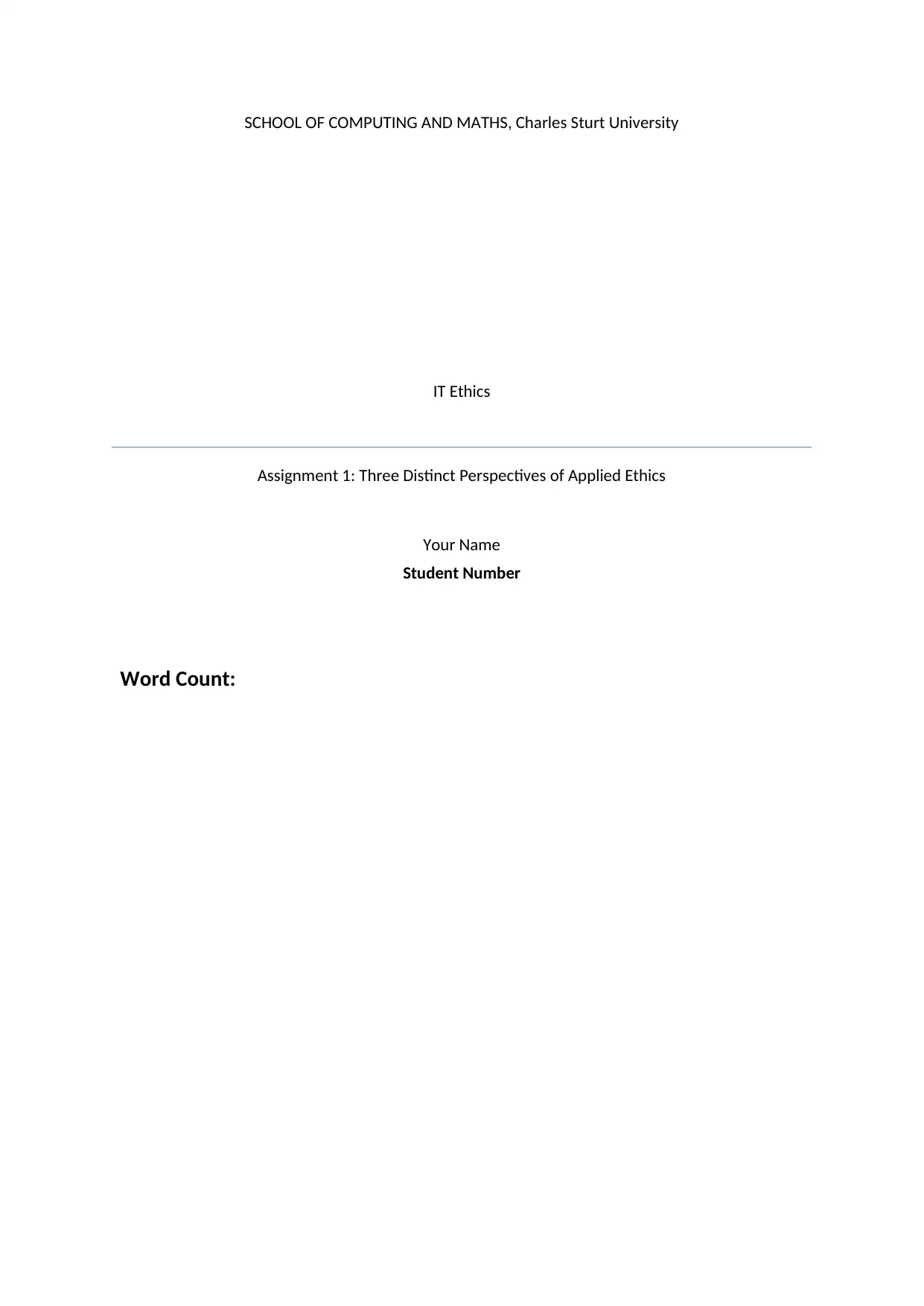
SCHOOL OF COMPUTING AND MATHS, Charles Sturt University
IT Ethics
Assignment 1: Three Distinct Perspectives of Applied Ethics
Your Name
Student Number
Word Count:
IT Ethics
Assignment 1: Three Distinct Perspectives of Applied Ethics
Your Name
Student Number
Word Count:
Paraphrase This Document
Need a fresh take? Get an instant paraphrase of this document with our AI Paraphraser
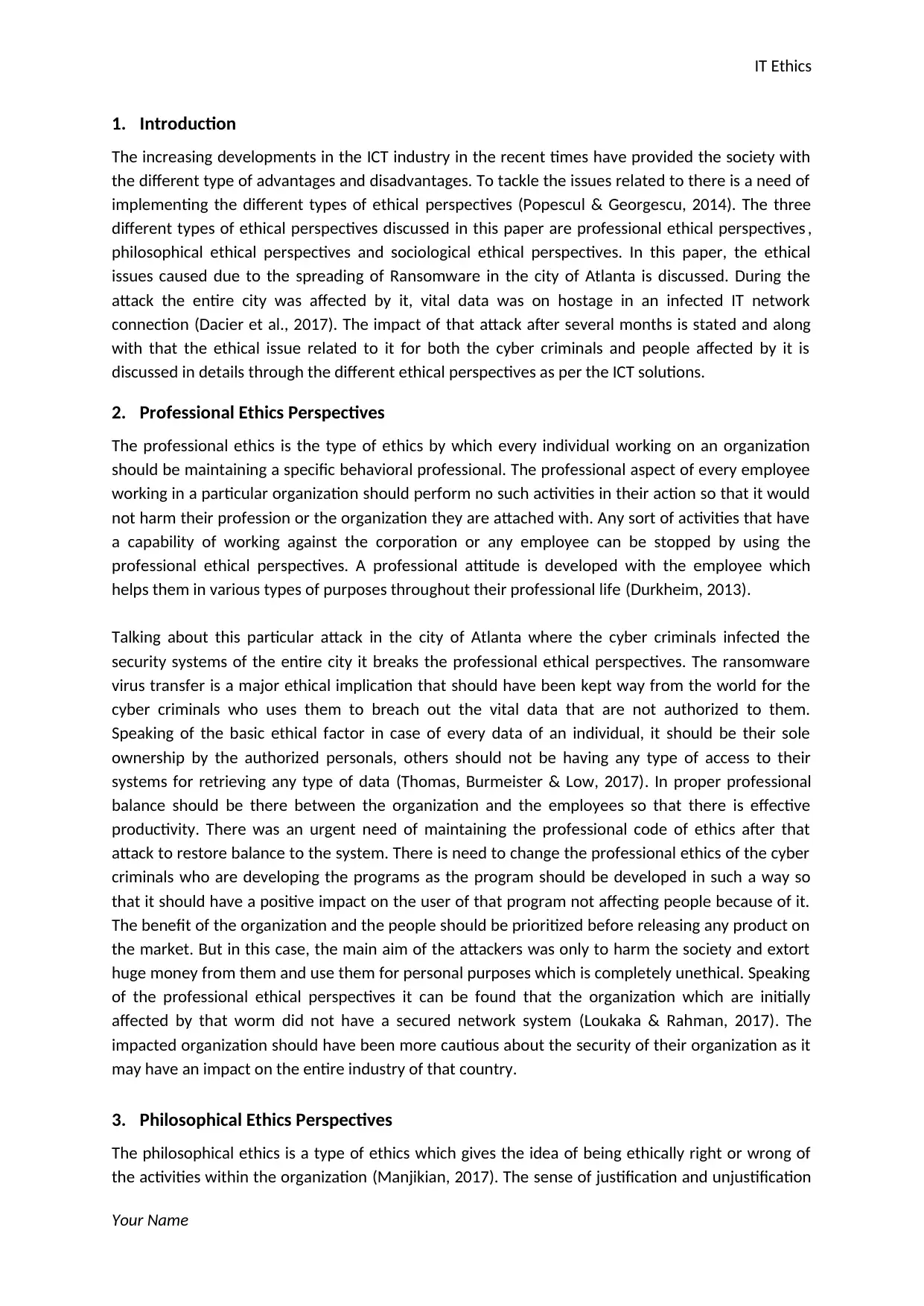
IT Ethics
1. Introduction
The increasing developments in the ICT industry in the recent times have provided the society with
the different type of advantages and disadvantages. To tackle the issues related to there is a need of
implementing the different types of ethical perspectives (Popescul & Georgescu, 2014). The three
different types of ethical perspectives discussed in this paper are professional ethical perspectives ,
philosophical ethical perspectives and sociological ethical perspectives. In this paper, the ethical
issues caused due to the spreading of Ransomware in the city of Atlanta is discussed. During the
attack the entire city was affected by it, vital data was on hostage in an infected IT network
connection (Dacier et al., 2017). The impact of that attack after several months is stated and along
with that the ethical issue related to it for both the cyber criminals and people affected by it is
discussed in details through the different ethical perspectives as per the ICT solutions.
2. Professional Ethics Perspectives
The professional ethics is the type of ethics by which every individual working on an organization
should be maintaining a specific behavioral professional. The professional aspect of every employee
working in a particular organization should perform no such activities in their action so that it would
not harm their profession or the organization they are attached with. Any sort of activities that have
a capability of working against the corporation or any employee can be stopped by using the
professional ethical perspectives. A professional attitude is developed with the employee which
helps them in various types of purposes throughout their professional life (Durkheim, 2013).
Talking about this particular attack in the city of Atlanta where the cyber criminals infected the
security systems of the entire city it breaks the professional ethical perspectives. The ransomware
virus transfer is a major ethical implication that should have been kept way from the world for the
cyber criminals who uses them to breach out the vital data that are not authorized to them.
Speaking of the basic ethical factor in case of every data of an individual, it should be their sole
ownership by the authorized personals, others should not be having any type of access to their
systems for retrieving any type of data (Thomas, Burmeister & Low, 2017). In proper professional
balance should be there between the organization and the employees so that there is effective
productivity. There was an urgent need of maintaining the professional code of ethics after that
attack to restore balance to the system. There is need to change the professional ethics of the cyber
criminals who are developing the programs as the program should be developed in such a way so
that it should have a positive impact on the user of that program not affecting people because of it.
The benefit of the organization and the people should be prioritized before releasing any product on
the market. But in this case, the main aim of the attackers was only to harm the society and extort
huge money from them and use them for personal purposes which is completely unethical. Speaking
of the professional ethical perspectives it can be found that the organization which are initially
affected by that worm did not have a secured network system (Loukaka & Rahman, 2017). The
impacted organization should have been more cautious about the security of their organization as it
may have an impact on the entire industry of that country.
3. Philosophical Ethics Perspectives
The philosophical ethics is a type of ethics which gives the idea of being ethically right or wrong of
the activities within the organization (Manjikian, 2017). The sense of justification and unjustification
Your Name
1. Introduction
The increasing developments in the ICT industry in the recent times have provided the society with
the different type of advantages and disadvantages. To tackle the issues related to there is a need of
implementing the different types of ethical perspectives (Popescul & Georgescu, 2014). The three
different types of ethical perspectives discussed in this paper are professional ethical perspectives ,
philosophical ethical perspectives and sociological ethical perspectives. In this paper, the ethical
issues caused due to the spreading of Ransomware in the city of Atlanta is discussed. During the
attack the entire city was affected by it, vital data was on hostage in an infected IT network
connection (Dacier et al., 2017). The impact of that attack after several months is stated and along
with that the ethical issue related to it for both the cyber criminals and people affected by it is
discussed in details through the different ethical perspectives as per the ICT solutions.
2. Professional Ethics Perspectives
The professional ethics is the type of ethics by which every individual working on an organization
should be maintaining a specific behavioral professional. The professional aspect of every employee
working in a particular organization should perform no such activities in their action so that it would
not harm their profession or the organization they are attached with. Any sort of activities that have
a capability of working against the corporation or any employee can be stopped by using the
professional ethical perspectives. A professional attitude is developed with the employee which
helps them in various types of purposes throughout their professional life (Durkheim, 2013).
Talking about this particular attack in the city of Atlanta where the cyber criminals infected the
security systems of the entire city it breaks the professional ethical perspectives. The ransomware
virus transfer is a major ethical implication that should have been kept way from the world for the
cyber criminals who uses them to breach out the vital data that are not authorized to them.
Speaking of the basic ethical factor in case of every data of an individual, it should be their sole
ownership by the authorized personals, others should not be having any type of access to their
systems for retrieving any type of data (Thomas, Burmeister & Low, 2017). In proper professional
balance should be there between the organization and the employees so that there is effective
productivity. There was an urgent need of maintaining the professional code of ethics after that
attack to restore balance to the system. There is need to change the professional ethics of the cyber
criminals who are developing the programs as the program should be developed in such a way so
that it should have a positive impact on the user of that program not affecting people because of it.
The benefit of the organization and the people should be prioritized before releasing any product on
the market. But in this case, the main aim of the attackers was only to harm the society and extort
huge money from them and use them for personal purposes which is completely unethical. Speaking
of the professional ethical perspectives it can be found that the organization which are initially
affected by that worm did not have a secured network system (Loukaka & Rahman, 2017). The
impacted organization should have been more cautious about the security of their organization as it
may have an impact on the entire industry of that country.
3. Philosophical Ethics Perspectives
The philosophical ethics is a type of ethics which gives the idea of being ethically right or wrong of
the activities within the organization (Manjikian, 2017). The sense of justification and unjustification
Your Name
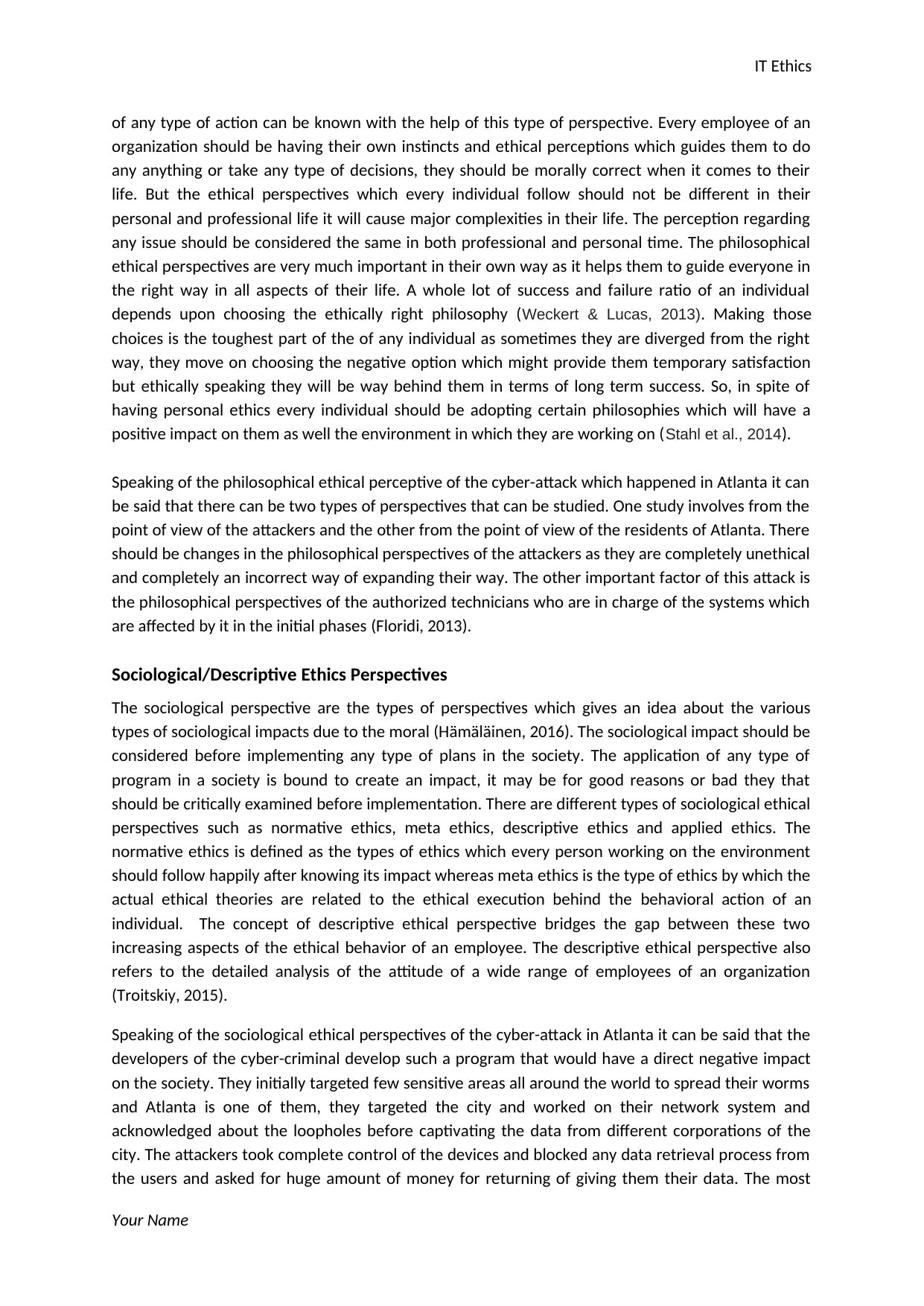
IT Ethics
of any type of action can be known with the help of this type of perspective. Every employee of an
organization should be having their own instincts and ethical perceptions which guides them to do
any anything or take any type of decisions, they should be morally correct when it comes to their
life. But the ethical perspectives which every individual follow should not be different in their
personal and professional life it will cause major complexities in their life. The perception regarding
any issue should be considered the same in both professional and personal time. The philosophical
ethical perspectives are very much important in their own way as it helps them to guide everyone in
the right way in all aspects of their life. A whole lot of success and failure ratio of an individual
depends upon choosing the ethically right philosophy (Weckert & Lucas, 2013). Making those
choices is the toughest part of the of any individual as sometimes they are diverged from the right
way, they move on choosing the negative option which might provide them temporary satisfaction
but ethically speaking they will be way behind them in terms of long term success. So, in spite of
having personal ethics every individual should be adopting certain philosophies which will have a
positive impact on them as well the environment in which they are working on (Stahl et al., 2014).
Speaking of the philosophical ethical perceptive of the cyber-attack which happened in Atlanta it can
be said that there can be two types of perspectives that can be studied. One study involves from the
point of view of the attackers and the other from the point of view of the residents of Atlanta. There
should be changes in the philosophical perspectives of the attackers as they are completely unethical
and completely an incorrect way of expanding their way. The other important factor of this attack is
the philosophical perspectives of the authorized technicians who are in charge of the systems which
are affected by it in the initial phases (Floridi, 2013).
Sociological/Descriptive Ethics Perspectives
The sociological perspective are the types of perspectives which gives an idea about the various
types of sociological impacts due to the moral (Hämäläinen, 2016). The sociological impact should be
considered before implementing any type of plans in the society. The application of any type of
program in a society is bound to create an impact, it may be for good reasons or bad they that
should be critically examined before implementation. There are different types of sociological ethical
perspectives such as normative ethics, meta ethics, descriptive ethics and applied ethics. The
normative ethics is defined as the types of ethics which every person working on the environment
should follow happily after knowing its impact whereas meta ethics is the type of ethics by which the
actual ethical theories are related to the ethical execution behind the behavioral action of an
individual. The concept of descriptive ethical perspective bridges the gap between these two
increasing aspects of the ethical behavior of an employee. The descriptive ethical perspective also
refers to the detailed analysis of the attitude of a wide range of employees of an organization
(Troitskiy, 2015).
Speaking of the sociological ethical perspectives of the cyber-attack in Atlanta it can be said that the
developers of the cyber-criminal develop such a program that would have a direct negative impact
on the society. They initially targeted few sensitive areas all around the world to spread their worms
and Atlanta is one of them, they targeted the city and worked on their network system and
acknowledged about the loopholes before captivating the data from different corporations of the
city. The attackers took complete control of the devices and blocked any data retrieval process from
the users and asked for huge amount of money for returning of giving them their data. The most
Your Name
of any type of action can be known with the help of this type of perspective. Every employee of an
organization should be having their own instincts and ethical perceptions which guides them to do
any anything or take any type of decisions, they should be morally correct when it comes to their
life. But the ethical perspectives which every individual follow should not be different in their
personal and professional life it will cause major complexities in their life. The perception regarding
any issue should be considered the same in both professional and personal time. The philosophical
ethical perspectives are very much important in their own way as it helps them to guide everyone in
the right way in all aspects of their life. A whole lot of success and failure ratio of an individual
depends upon choosing the ethically right philosophy (Weckert & Lucas, 2013). Making those
choices is the toughest part of the of any individual as sometimes they are diverged from the right
way, they move on choosing the negative option which might provide them temporary satisfaction
but ethically speaking they will be way behind them in terms of long term success. So, in spite of
having personal ethics every individual should be adopting certain philosophies which will have a
positive impact on them as well the environment in which they are working on (Stahl et al., 2014).
Speaking of the philosophical ethical perceptive of the cyber-attack which happened in Atlanta it can
be said that there can be two types of perspectives that can be studied. One study involves from the
point of view of the attackers and the other from the point of view of the residents of Atlanta. There
should be changes in the philosophical perspectives of the attackers as they are completely unethical
and completely an incorrect way of expanding their way. The other important factor of this attack is
the philosophical perspectives of the authorized technicians who are in charge of the systems which
are affected by it in the initial phases (Floridi, 2013).
Sociological/Descriptive Ethics Perspectives
The sociological perspective are the types of perspectives which gives an idea about the various
types of sociological impacts due to the moral (Hämäläinen, 2016). The sociological impact should be
considered before implementing any type of plans in the society. The application of any type of
program in a society is bound to create an impact, it may be for good reasons or bad they that
should be critically examined before implementation. There are different types of sociological ethical
perspectives such as normative ethics, meta ethics, descriptive ethics and applied ethics. The
normative ethics is defined as the types of ethics which every person working on the environment
should follow happily after knowing its impact whereas meta ethics is the type of ethics by which the
actual ethical theories are related to the ethical execution behind the behavioral action of an
individual. The concept of descriptive ethical perspective bridges the gap between these two
increasing aspects of the ethical behavior of an employee. The descriptive ethical perspective also
refers to the detailed analysis of the attitude of a wide range of employees of an organization
(Troitskiy, 2015).
Speaking of the sociological ethical perspectives of the cyber-attack in Atlanta it can be said that the
developers of the cyber-criminal develop such a program that would have a direct negative impact
on the society. They initially targeted few sensitive areas all around the world to spread their worms
and Atlanta is one of them, they targeted the city and worked on their network system and
acknowledged about the loopholes before captivating the data from different corporations of the
city. The attackers took complete control of the devices and blocked any data retrieval process from
the users and asked for huge amount of money for returning of giving them their data. The most
Your Name
⊘ This is a preview!⊘
Do you want full access?
Subscribe today to unlock all pages.

Trusted by 1+ million students worldwide
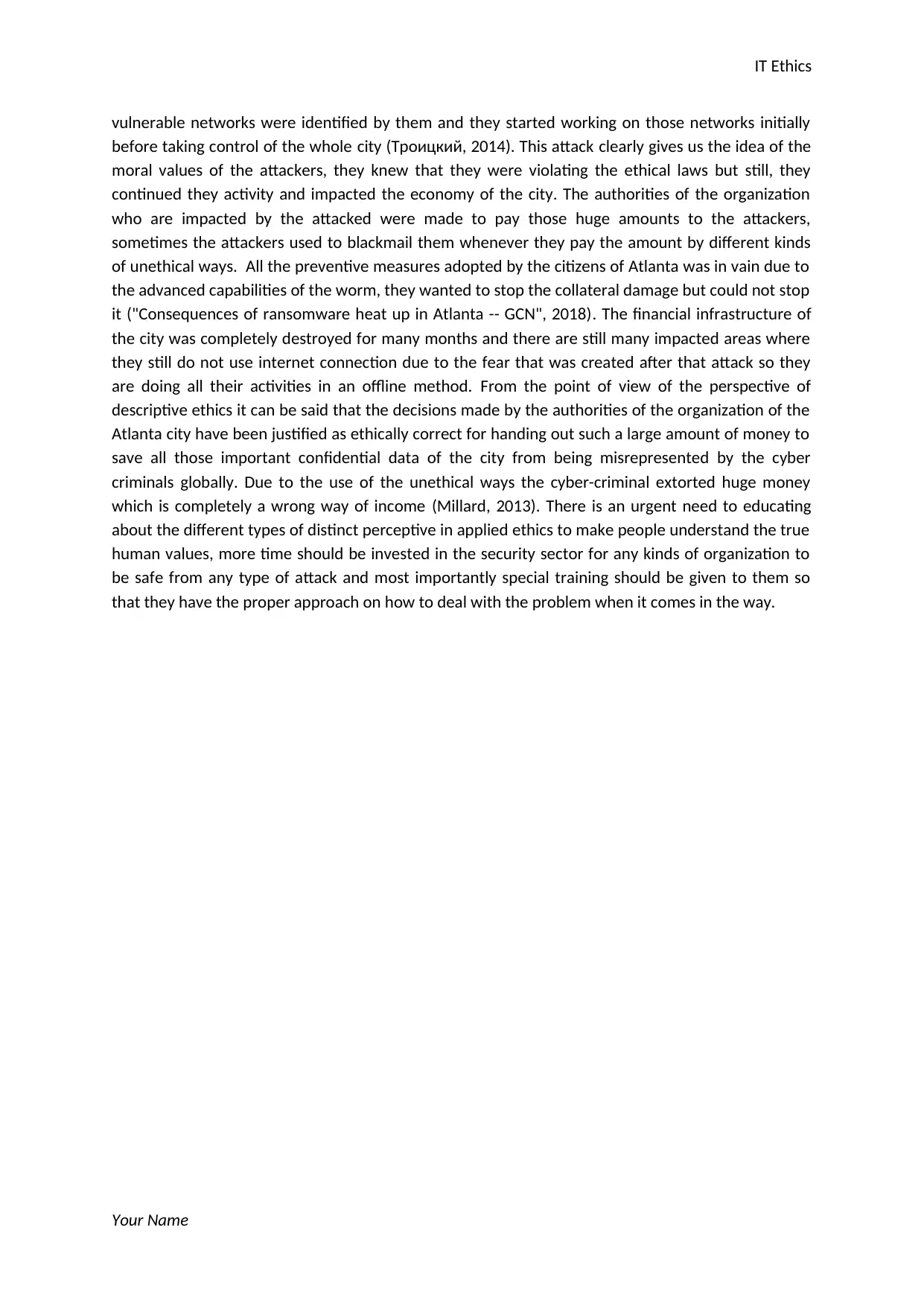
IT Ethics
vulnerable networks were identified by them and they started working on those networks initially
before taking control of the whole city (Троицкий, 2014). This attack clearly gives us the idea of the
moral values of the attackers, they knew that they were violating the ethical laws but still, they
continued they activity and impacted the economy of the city. The authorities of the organization
who are impacted by the attacked were made to pay those huge amounts to the attackers,
sometimes the attackers used to blackmail them whenever they pay the amount by different kinds
of unethical ways. All the preventive measures adopted by the citizens of Atlanta was in vain due to
the advanced capabilities of the worm, they wanted to stop the collateral damage but could not stop
it ("Consequences of ransomware heat up in Atlanta -- GCN", 2018). The financial infrastructure of
the city was completely destroyed for many months and there are still many impacted areas where
they still do not use internet connection due to the fear that was created after that attack so they
are doing all their activities in an offline method. From the point of view of the perspective of
descriptive ethics it can be said that the decisions made by the authorities of the organization of the
Atlanta city have been justified as ethically correct for handing out such a large amount of money to
save all those important confidential data of the city from being misrepresented by the cyber
criminals globally. Due to the use of the unethical ways the cyber-criminal extorted huge money
which is completely a wrong way of income (Millard, 2013). There is an urgent need to educating
about the different types of distinct perceptive in applied ethics to make people understand the true
human values, more time should be invested in the security sector for any kinds of organization to
be safe from any type of attack and most importantly special training should be given to them so
that they have the proper approach on how to deal with the problem when it comes in the way.
Your Name
vulnerable networks were identified by them and they started working on those networks initially
before taking control of the whole city (Троицкий, 2014). This attack clearly gives us the idea of the
moral values of the attackers, they knew that they were violating the ethical laws but still, they
continued they activity and impacted the economy of the city. The authorities of the organization
who are impacted by the attacked were made to pay those huge amounts to the attackers,
sometimes the attackers used to blackmail them whenever they pay the amount by different kinds
of unethical ways. All the preventive measures adopted by the citizens of Atlanta was in vain due to
the advanced capabilities of the worm, they wanted to stop the collateral damage but could not stop
it ("Consequences of ransomware heat up in Atlanta -- GCN", 2018). The financial infrastructure of
the city was completely destroyed for many months and there are still many impacted areas where
they still do not use internet connection due to the fear that was created after that attack so they
are doing all their activities in an offline method. From the point of view of the perspective of
descriptive ethics it can be said that the decisions made by the authorities of the organization of the
Atlanta city have been justified as ethically correct for handing out such a large amount of money to
save all those important confidential data of the city from being misrepresented by the cyber
criminals globally. Due to the use of the unethical ways the cyber-criminal extorted huge money
which is completely a wrong way of income (Millard, 2013). There is an urgent need to educating
about the different types of distinct perceptive in applied ethics to make people understand the true
human values, more time should be invested in the security sector for any kinds of organization to
be safe from any type of attack and most importantly special training should be given to them so
that they have the proper approach on how to deal with the problem when it comes in the way.
Your Name
Paraphrase This Document
Need a fresh take? Get an instant paraphrase of this document with our AI Paraphraser
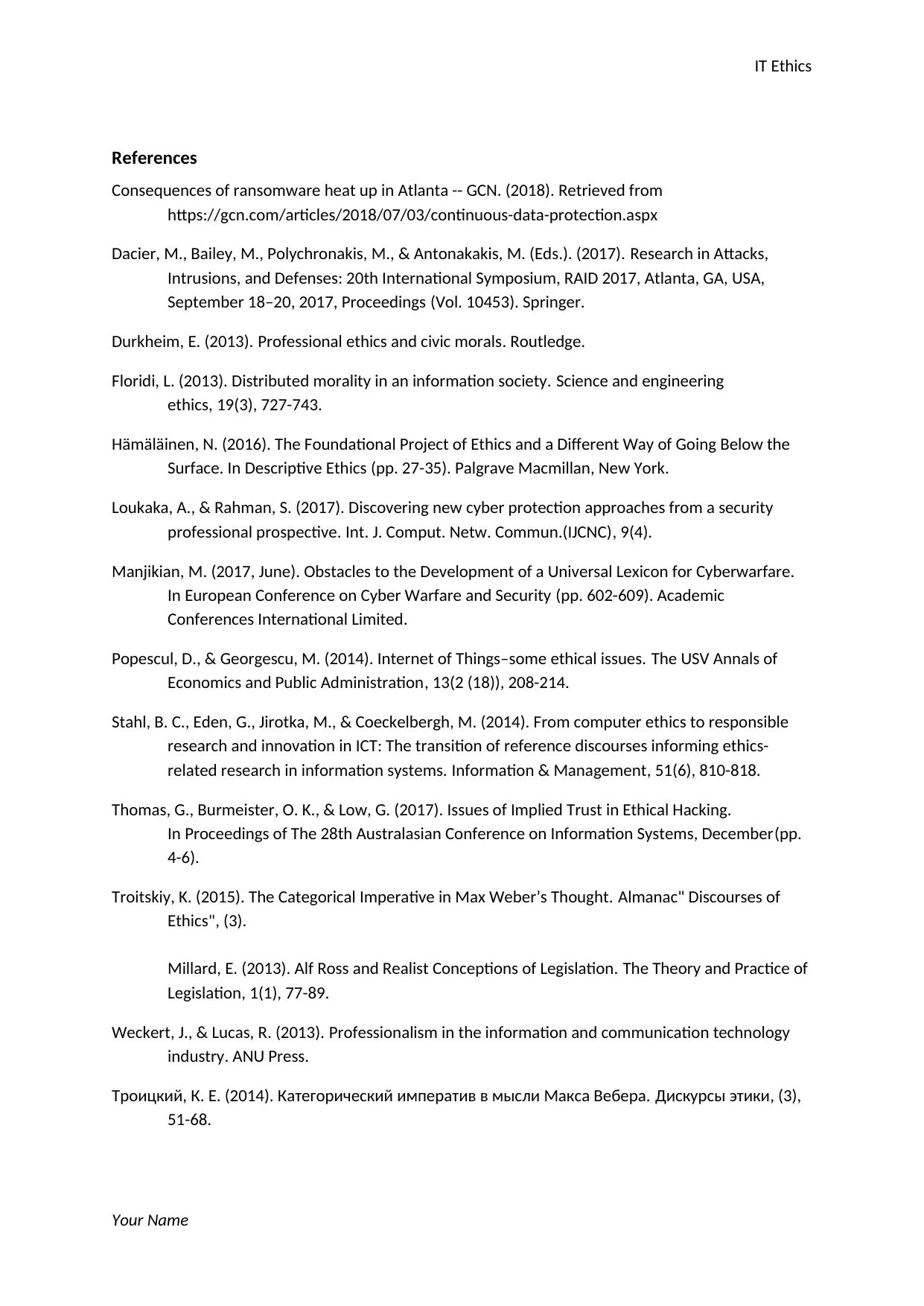
IT Ethics
References
Consequences of ransomware heat up in Atlanta -- GCN. (2018). Retrieved from
https://gcn.com/articles/2018/07/03/continuous-data-protection.aspx
Dacier, M., Bailey, M., Polychronakis, M., & Antonakakis, M. (Eds.). (2017). Research in Attacks,
Intrusions, and Defenses: 20th International Symposium, RAID 2017, Atlanta, GA, USA,
September 18–20, 2017, Proceedings (Vol. 10453). Springer.
Durkheim, E. (2013). Professional ethics and civic morals. Routledge.
Floridi, L. (2013). Distributed morality in an information society. Science and engineering
ethics, 19(3), 727-743.
Hämäläinen, N. (2016). The Foundational Project of Ethics and a Different Way of Going Below the
Surface. In Descriptive Ethics (pp. 27-35). Palgrave Macmillan, New York.
Loukaka, A., & Rahman, S. (2017). Discovering new cyber protection approaches from a security
professional prospective. Int. J. Comput. Netw. Commun.(IJCNC), 9(4).
Manjikian, M. (2017, June). Obstacles to the Development of a Universal Lexicon for Cyberwarfare.
In European Conference on Cyber Warfare and Security (pp. 602-609). Academic
Conferences International Limited.
Popescul, D., & Georgescu, M. (2014). Internet of Things–some ethical issues. The USV Annals of
Economics and Public Administration, 13(2 (18)), 208-214.
Stahl, B. C., Eden, G., Jirotka, M., & Coeckelbergh, M. (2014). From computer ethics to responsible
research and innovation in ICT: The transition of reference discourses informing ethics-
related research in information systems. Information & Management, 51(6), 810-818.
Thomas, G., Burmeister, O. K., & Low, G. (2017). Issues of Implied Trust in Ethical Hacking.
In Proceedings of The 28th Australasian Conference on Information Systems, December(pp.
4-6).
Troitskiy, K. (2015). The Categorical Imperative in Max Weber’s Thought. Almanac" Discourses of
Ethics", (3).
Millard, E. (2013). Alf Ross and Realist Conceptions of Legislation. The Theory and Practice of
Legislation, 1(1), 77-89.
Weckert, J., & Lucas, R. (2013). Professionalism in the information and communication technology
industry. ANU Press.
Троицкий, К. Е. (2014). Категорический императив в мысли Макса Вебера. Дискурсы этики, (3),
51-68.
Your Name
References
Consequences of ransomware heat up in Atlanta -- GCN. (2018). Retrieved from
https://gcn.com/articles/2018/07/03/continuous-data-protection.aspx
Dacier, M., Bailey, M., Polychronakis, M., & Antonakakis, M. (Eds.). (2017). Research in Attacks,
Intrusions, and Defenses: 20th International Symposium, RAID 2017, Atlanta, GA, USA,
September 18–20, 2017, Proceedings (Vol. 10453). Springer.
Durkheim, E. (2013). Professional ethics and civic morals. Routledge.
Floridi, L. (2013). Distributed morality in an information society. Science and engineering
ethics, 19(3), 727-743.
Hämäläinen, N. (2016). The Foundational Project of Ethics and a Different Way of Going Below the
Surface. In Descriptive Ethics (pp. 27-35). Palgrave Macmillan, New York.
Loukaka, A., & Rahman, S. (2017). Discovering new cyber protection approaches from a security
professional prospective. Int. J. Comput. Netw. Commun.(IJCNC), 9(4).
Manjikian, M. (2017, June). Obstacles to the Development of a Universal Lexicon for Cyberwarfare.
In European Conference on Cyber Warfare and Security (pp. 602-609). Academic
Conferences International Limited.
Popescul, D., & Georgescu, M. (2014). Internet of Things–some ethical issues. The USV Annals of
Economics and Public Administration, 13(2 (18)), 208-214.
Stahl, B. C., Eden, G., Jirotka, M., & Coeckelbergh, M. (2014). From computer ethics to responsible
research and innovation in ICT: The transition of reference discourses informing ethics-
related research in information systems. Information & Management, 51(6), 810-818.
Thomas, G., Burmeister, O. K., & Low, G. (2017). Issues of Implied Trust in Ethical Hacking.
In Proceedings of The 28th Australasian Conference on Information Systems, December(pp.
4-6).
Troitskiy, K. (2015). The Categorical Imperative in Max Weber’s Thought. Almanac" Discourses of
Ethics", (3).
Millard, E. (2013). Alf Ross and Realist Conceptions of Legislation. The Theory and Practice of
Legislation, 1(1), 77-89.
Weckert, J., & Lucas, R. (2013). Professionalism in the information and communication technology
industry. ANU Press.
Троицкий, К. Е. (2014). Категорический императив в мысли Макса Вебера. Дискурсы этики, (3),
51-68.
Your Name
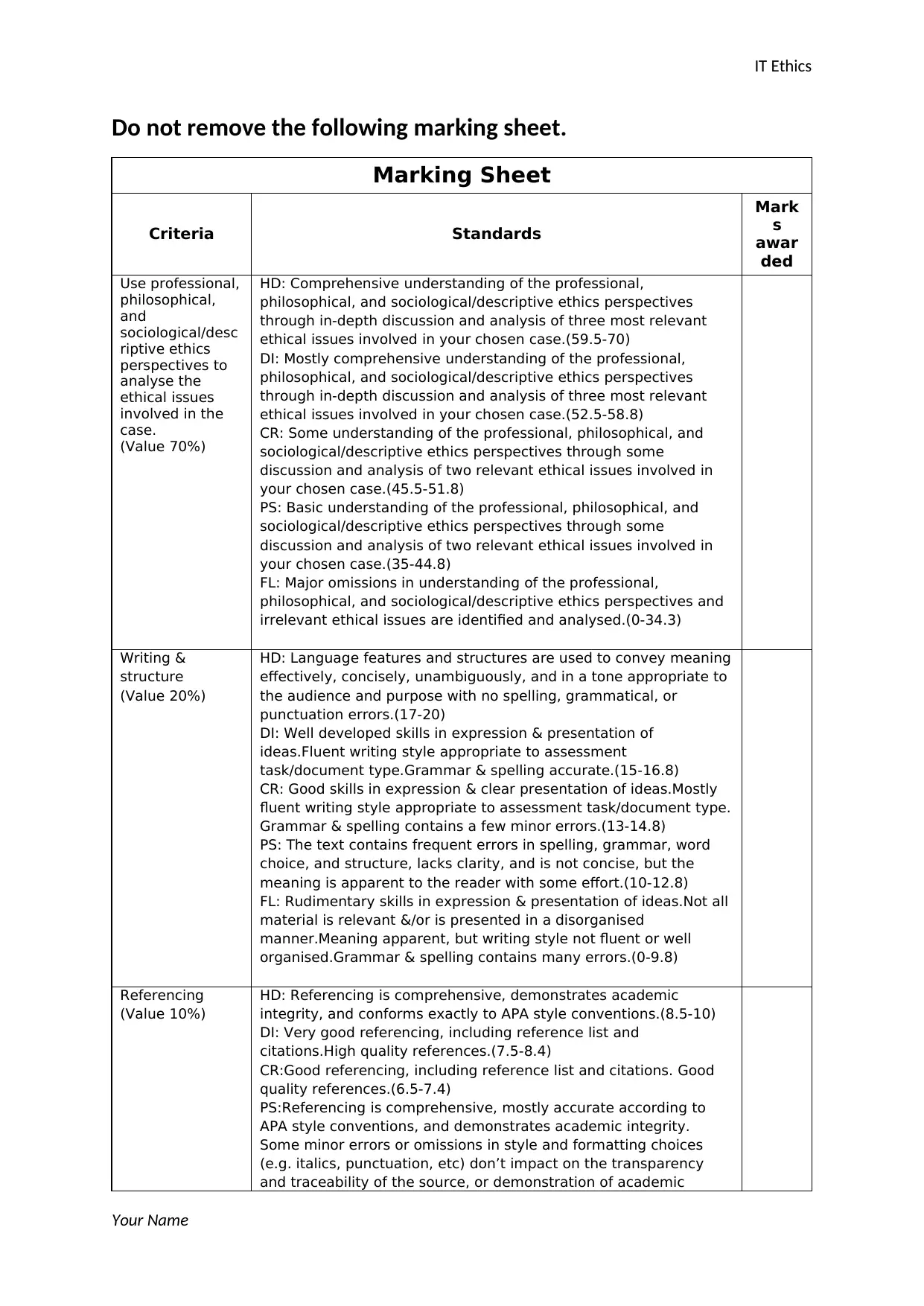
IT Ethics
Do not remove the following marking sheet.
Marking Sheet
Criteria Standards
Mark
s
awar
ded
Use professional,
philosophical,
and
sociological/desc
riptive ethics
perspectives to
analyse the
ethical issues
involved in the
case.
(Value 70%)
HD: Comprehensive understanding of the professional,
philosophical, and sociological/descriptive ethics perspectives
through in-depth discussion and analysis of three most relevant
ethical issues involved in your chosen case.(59.5-70)
DI: Mostly comprehensive understanding of the professional,
philosophical, and sociological/descriptive ethics perspectives
through in-depth discussion and analysis of three most relevant
ethical issues involved in your chosen case.(52.5-58.8)
CR: Some understanding of the professional, philosophical, and
sociological/descriptive ethics perspectives through some
discussion and analysis of two relevant ethical issues involved in
your chosen case.(45.5-51.8)
PS: Basic understanding of the professional, philosophical, and
sociological/descriptive ethics perspectives through some
discussion and analysis of two relevant ethical issues involved in
your chosen case.(35-44.8)
FL: Major omissions in understanding of the professional,
philosophical, and sociological/descriptive ethics perspectives and
irrelevant ethical issues are identified and analysed.(0-34.3)
Writing &
structure
(Value 20%)
HD: Language features and structures are used to convey meaning
effectively, concisely, unambiguously, and in a tone appropriate to
the audience and purpose with no spelling, grammatical, or
punctuation errors.(17-20)
DI: Well developed skills in expression & presentation of
ideas.Fluent writing style appropriate to assessment
task/document type.Grammar & spelling accurate.(15-16.8)
CR: Good skills in expression & clear presentation of ideas.Mostly
fluent writing style appropriate to assessment task/document type.
Grammar & spelling contains a few minor errors.(13-14.8)
PS: The text contains frequent errors in spelling, grammar, word
choice, and structure, lacks clarity, and is not concise, but the
meaning is apparent to the reader with some effort.(10-12.8)
FL: Rudimentary skills in expression & presentation of ideas.Not all
material is relevant &/or is presented in a disorganised
manner.Meaning apparent, but writing style not fluent or well
organised.Grammar & spelling contains many errors.(0-9.8)
Referencing
(Value 10%)
HD: Referencing is comprehensive, demonstrates academic
integrity, and conforms exactly to APA style conventions.(8.5-10)
DI: Very good referencing, including reference list and
citations.High quality references.(7.5-8.4)
CR:Good referencing, including reference list and citations. Good
quality references.(6.5-7.4)
PS:Referencing is comprehensive, mostly accurate according to
APA style conventions, and demonstrates academic integrity.
Some minor errors or omissions in style and formatting choices
(e.g. italics, punctuation, etc) don’t impact on the transparency
and traceability of the source, or demonstration of academic
Your Name
Do not remove the following marking sheet.
Marking Sheet
Criteria Standards
Mark
s
awar
ded
Use professional,
philosophical,
and
sociological/desc
riptive ethics
perspectives to
analyse the
ethical issues
involved in the
case.
(Value 70%)
HD: Comprehensive understanding of the professional,
philosophical, and sociological/descriptive ethics perspectives
through in-depth discussion and analysis of three most relevant
ethical issues involved in your chosen case.(59.5-70)
DI: Mostly comprehensive understanding of the professional,
philosophical, and sociological/descriptive ethics perspectives
through in-depth discussion and analysis of three most relevant
ethical issues involved in your chosen case.(52.5-58.8)
CR: Some understanding of the professional, philosophical, and
sociological/descriptive ethics perspectives through some
discussion and analysis of two relevant ethical issues involved in
your chosen case.(45.5-51.8)
PS: Basic understanding of the professional, philosophical, and
sociological/descriptive ethics perspectives through some
discussion and analysis of two relevant ethical issues involved in
your chosen case.(35-44.8)
FL: Major omissions in understanding of the professional,
philosophical, and sociological/descriptive ethics perspectives and
irrelevant ethical issues are identified and analysed.(0-34.3)
Writing &
structure
(Value 20%)
HD: Language features and structures are used to convey meaning
effectively, concisely, unambiguously, and in a tone appropriate to
the audience and purpose with no spelling, grammatical, or
punctuation errors.(17-20)
DI: Well developed skills in expression & presentation of
ideas.Fluent writing style appropriate to assessment
task/document type.Grammar & spelling accurate.(15-16.8)
CR: Good skills in expression & clear presentation of ideas.Mostly
fluent writing style appropriate to assessment task/document type.
Grammar & spelling contains a few minor errors.(13-14.8)
PS: The text contains frequent errors in spelling, grammar, word
choice, and structure, lacks clarity, and is not concise, but the
meaning is apparent to the reader with some effort.(10-12.8)
FL: Rudimentary skills in expression & presentation of ideas.Not all
material is relevant &/or is presented in a disorganised
manner.Meaning apparent, but writing style not fluent or well
organised.Grammar & spelling contains many errors.(0-9.8)
Referencing
(Value 10%)
HD: Referencing is comprehensive, demonstrates academic
integrity, and conforms exactly to APA style conventions.(8.5-10)
DI: Very good referencing, including reference list and
citations.High quality references.(7.5-8.4)
CR:Good referencing, including reference list and citations. Good
quality references.(6.5-7.4)
PS:Referencing is comprehensive, mostly accurate according to
APA style conventions, and demonstrates academic integrity.
Some minor errors or omissions in style and formatting choices
(e.g. italics, punctuation, etc) don’t impact on the transparency
and traceability of the source, or demonstration of academic
Your Name
⊘ This is a preview!⊘
Do you want full access?
Subscribe today to unlock all pages.

Trusted by 1+ million students worldwide
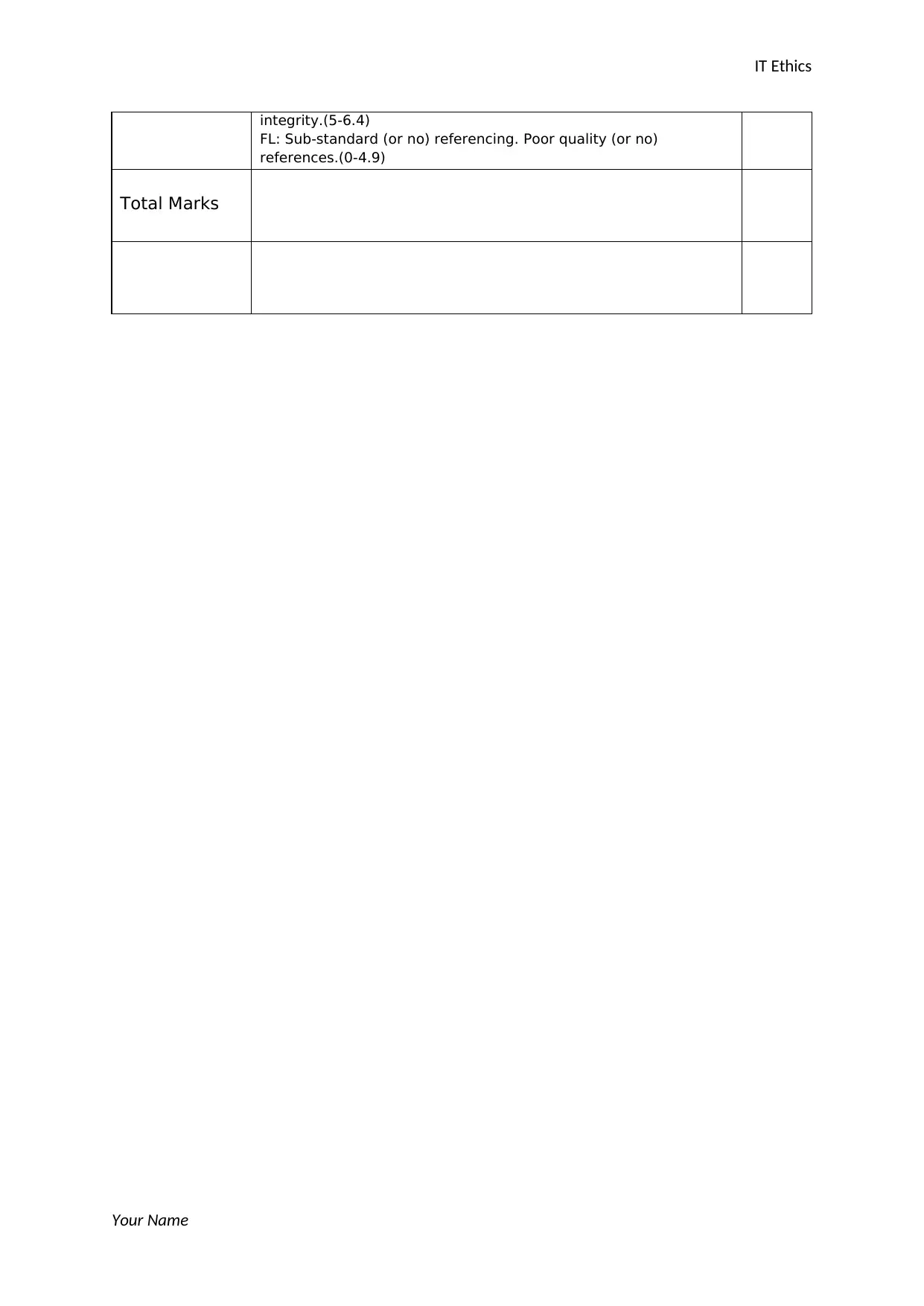
IT Ethics
integrity.(5-6.4)
FL: Sub-standard (or no) referencing. Poor quality (or no)
references.(0-4.9)
Total Marks
Your Name
integrity.(5-6.4)
FL: Sub-standard (or no) referencing. Poor quality (or no)
references.(0-4.9)
Total Marks
Your Name
1 out of 7
Related Documents
Your All-in-One AI-Powered Toolkit for Academic Success.
+13062052269
info@desklib.com
Available 24*7 on WhatsApp / Email
![[object Object]](/_next/static/media/star-bottom.7253800d.svg)
Unlock your academic potential
Copyright © 2020–2026 A2Z Services. All Rights Reserved. Developed and managed by ZUCOL.




